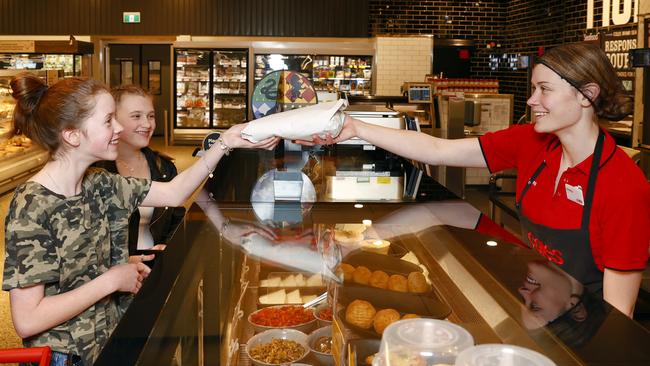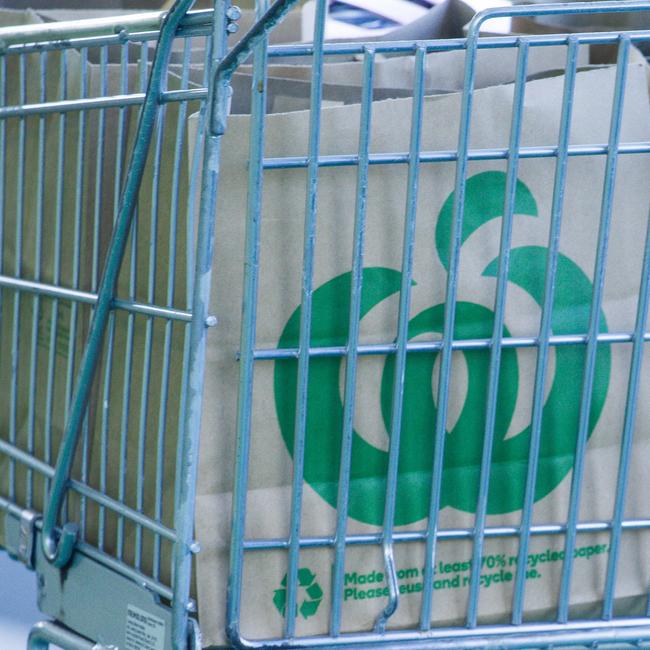Editor’s view: No guarantee supermarket gouging will stop, despite threat of huge fines
The Albanese government’s crackdown on supermarkets that treat their suppliers poorly won’t necessarily translate into lower prices at the checkout, writes the editor.

Opinion
Don't miss out on the headlines from Opinion. Followed categories will be added to My News.
Do not expect the federal government’s threat of multimillion-dollar fines for supermarkets that treat their suppliers badly to automatically translate into lower grocery prices – even though that is exactly what the Albanese administration would love you to believe.
“We’re cracking down on anti-competitive behaviour in supermarkets, so people get fairer prices at the checkout,” Treasurer Jim Chalmers, Agriculture Minister Murray Watt and Competition Minister Andrew Leigh said in a joint statement on Sunday announcing support for a new mandatory food and grocery code of conduct with tough penalties for breaches.
But when pressed on Channel 7’s Sunrise on Monday about what sort of price drops we might actually see, Dr Chalmers had the good sense to duck the question.
That is because this latest move by the government is all about trying to level the playing field between suppliers and the supermarket giants rather than addressing perceived price gouging of consumers.

The Australian Competition and Consumer Commission is conducting a separate inquiry into supermarket pricing practices, which it is scheduled to report on in August next year.
Of course, smoother relations between suppliers and buyers could well lead to some price relief at the supermarket checkout.
Or, perversely, perhaps we could even see higher prices if, for instance, the new rules gave suppliers more courage to resist top-down demands for discounts.
Only a treasurer trying to make a rod for their own back would attempt to speculate on possible outcomes like those.
The new food and grocery code of conduct is the product of a review led by former Labor minister Craig Emerson, and will replace an existing voluntary scheme that has been judged to be ineffectual.

Dr Emerson’s recommended model includes penalties that, in theory, could run into billions of dollars.
It also provides for an anonymous supplier and whistleblower complaints mechanism to reduce concerns about possible retribution against complainants under the current system.
Agricultural organisations have broadly welcomed the changes, with the National Farmers Federation saying they “should finally give the code the clout it needs to protect farmers”. Ausveg, which represents the vegetable, potato and onion industry, has also welcomed the government’s efforts to “address the power imbalance that disadvantages suppliers to big retailers”, but notes there is a way to go before the recommendations are actually operational.
It’s also fair to ask just how much government oversight is too much.
At what point does an effort to set the rules of engagement between suppliers and buyers end up simply creating more complexity and red tape and, ultimately, higher prices?

But the current voluntary code of conduct is clearly not working, at least as a mechanism for fielding complaints from potentially disgruntled suppliers who feel dudded by underhand buyer tactics.
No complaints at all were filed against any of the big supermarkets last year, a sign either that the current negotiating system is – improbably – working just fine, or as seems to be the case, judging from submissions to the Emerson inquiry, disgruntled suppliers live in fear of retribution if they kick up a fuss.
Improving the negotiating strength of smaller suppliers against the retail giants is worthwhile.
But whatever Dr Chalmers would have you believe, it’s not going to do much to relieve your own pressures.
G-G’s $200k pay rise just does not add up
Talk about not reading the room.
Prime Minister Anthony Albanese approving a $200,000 pay rise for Governor-General Sam Mostyn has not gone down well in the middle of a cost-of-living crisis, and nor should it.
She will now earn a staggering $709,000 for being the King’s representative in Australia – a jump that was explained by Assistant Minister to the Prime Minister Patrick Gorman as being partly because she doesn’t have a military pension to supplement her wage.
Apparently, surviving on a mere $509,000 a year, with two free houses, Government House in Canberra and Admiralty House on the harbour in Sydney, just isn’t possible. You know. Inflation.
It’s an even worse look following the criticism that came after Ms Mostyn’s appointment that she was too close to the political left.
But surely, being the G-G is not a career move. It’s not about earning the big cash. Ms Mostyn has already done that during an incredible career in the private sector, working high up with Optus, Cable & Wireless, Insurance Australia Group, Transurban and Citibank among others.
It’s an impressive resumé, but being the G-G is an honour, and surely she could fulfil her duties on a lousy $509,000 a year.
Read related topics:Cost of Living




